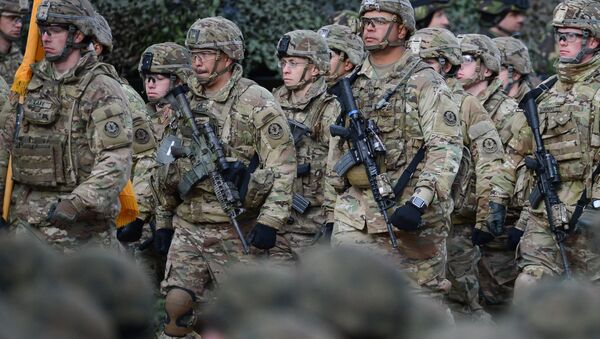MOSCOW (Sputnik) — The United States is using political pressure to draw the Balkan states into NATO, Moscow is concerned about such attempts, Andrey Kelin, director of the Russian Foreign Ministry's Department of European Cooperation (DEC), told Sputnik.
Kelin said Washington's key efforts were currently "aimed at fully mastering the western Balkans, and, after Montenegro, to draw other countries into its orbit too."
READ MORE: Editor Explains How NATO, EU Benefit From Silencing Russian Media
"We do not perceive this calmly, because any wave of NATO expansion, especially under the conditions of poor relations that currently exist, is an additional factor complicating European security," he said.
Commenting on the mid-November Pentagon statement that it had approved the $10.5 billion sale of Patriot missile defense systems to Poland planned to be delivered in 2019, Kelin has said that Moscow would take appropriate measures in response.
"We previously offered NATO some kinds of cooperation in the missile defense sphere that could remove this negative effect, but all our attempts and all our proposals were rejected. So we will certainly not just simply take this into account in our defense planning, but we will also take appropriate measures that will restore stability in Europe," Kelin said.
The official pointed at Finland and Sweden engaging in close cooperation with NATO, adding that Moscow was monitoring this situation.
Airspace Over Baltic Region
However, the senior diplomat has mentioned that the situation in the airspace over the Baltic region has calmed down.
READ MORE: What are the 'Ingredients' of a New Cold War?
"We know that NATO aspires to make this cooperation [with Finland and Sweden] strong enough to include them in its sphere of influence. At the same time, we know that there are quite independent forces both in Helsinki and Stockholm, which oppose entering NATO and stand for preserving the current status quo. We see the opportunities to work on enhancing security in the Baltics at a non-alliance level, and these opportunities are being used. It is extremely important nowadays, when there are many more warships, aircraft, and, therefore, military incidents are more probable," Kelin said.
The senior diplomat noted that Stockholm had confirmed during recent consultations that the situation over the Baltic airspace has become less tense.
"Following the adoption on the ICAO's [International Civil Aviation Organization] initiative for certain rules of conduct for so-called state aviation, which pertains to military aviation, the situation has calmed down, and no serious air incidents have been registered in recent days," Kelin explained.
NATO decided to boost its presence in the Baltic region as part of its strategy to increase its eastern flank capabilities during the 2016 summit in Warsaw.
Although Finland and Sweden are not NATO member states, the countries, along with Australia, Georgia and Jordan, are NATO's enhanced opportunities partners, which are distinguished by their considerable contribution to the alliance's operations and activities.
READ MORE: Finns Disenchanted With NATO, Enamored By EU
Concerns Over Russian-Belarusian Zapad-2017 Drills
The diplomat also touched upon NATO's concerns over the September Russian-Belarusian Zapad-2017 drills.
"Why do our Western partners worry, when they carry out large-scale drills themselves? For sure, it does not contribute to stability. We are convinced that in order to ensure predictability we have to exchange information on our drills and we are doing this via the NATO-Russia Council (NRC)," Kelin said.
Answering a question on whether or not Russia will further carry out drills similar to Zapad-2017, the high-ranking diplomat stated that it should be addressed to Russia's General Staff. Kelin, however, noted in this regard that while the Zapad-2017 military exercises were carried out, NATO conducted more than a dozen drills in Europe.
The Western states repeatedly raised concerns with regard to the joint drills, saying that the Russian troops, deployed in Belarus for the military exercises, were likely to stay in the country afterward, which was repeatedly refuted by Russia. Moscow confirmed that all Russian servicemen who had taken part in the drills left Belarus after the event.
NATO's presence in Eastern Europe has been rising after the eruption of the Ukrainian crisis in 2014, with the alliance using the alleged Russian interference in Ukrainian internal affairs as a pretext. Moscow has repeatedly voiced its protest over NATO's military buildup, saying that it will undermine regional stability and result in a new arms race.
Russia's Position on Donbass
Kelin has also outlined Moscow's position to the disputed issue of UN peacekeeping contingent in Donbass.
"Our position is that the UN operation should be carried out in support of the OSCE mission. The work of the OSCE Special Monitoring Mission has been on for quite a long time, it has its shortcomings, in particular, its reports are not always objective, but on the whole, we consider it is necessary there," Kelin said.
Asked whether Russia really does not intend to abandon its original position on peacekeepers, he said that "at the moment our position here is absolutely firm, it is absolutely justified, based on the implementation of the Minsk agreements."
This stance has been recently voiced by Russia's Foreign Minister Sergei Lavrov, who has said that the UN peacekeeping forces would be deployed in Donbass after a disengagement of troops and military equipment of the conflicting sides, it should be agreed upon with Kiev and the self-proclaimed Donetsk and Lugansk people's republics (DPR and LPR).
READ MORE: Russian Foreign Minister Claims Potential for Cooperation With US Still Untapped

